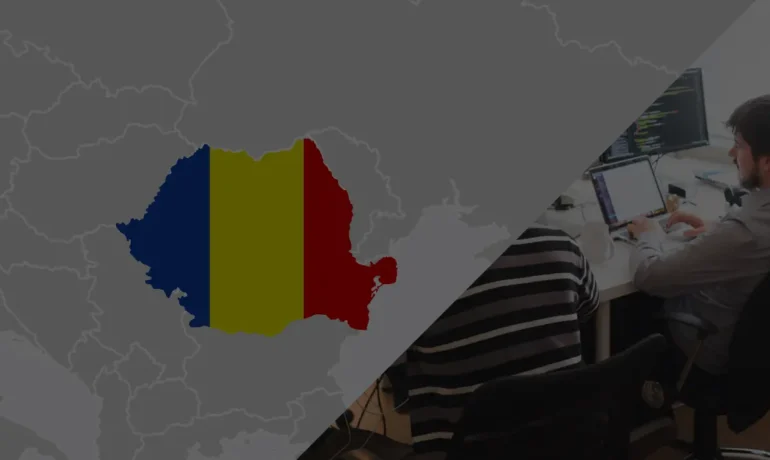Reading time: 13 minutes
Over the past decades, outsourcing has shifted gears. It’s no longer just about saving money. Nowadays, outsourcing enables companies to innovate, grow efficiently, and stay focused on what they do best. For companies ranging from startups to well-established companies, choosing the right outsourcing partner can have a direct impact on their success.
Software outsourcing to Romania has become an attractive option for companies in Europe and North America. With a highly skilled workforce, a strong emphasis on technical education, competitive rates, and solid compliance with EU data laws, Romania has quickly become one of the most trusted outsourcing destinations in Eastern Europe.
But with so many Romanian companies promising top-notch service, how do you know which one’s the right fit for you?
In this guide, we’ll walk you through the key things to look for – like technical know-how, communication, flexibility, and cultural compatibility – so you can make a well-informed decision and choose the right IT outsourcing company in Romania with confidence.
Why Choose Romania for Outsourcing?
Romania is seen as one of Europe’s well-known software outsourcing destinations. It’s not hard to see why. It offers a mix of skills, affordability, and reliability that’s hard to beat. Let’s check the reasons one by one:
Skilled IT talent
First, the talent pool is exceptional. One of Romania’s biggest strengths for outsourcing is the workforce. The country has built a good reputation for having talented professionals who combine technical know-how with good communication skills.
Take Cluj-Napoca, for example – sometimes called the „Silicon Valley of Eastern Europe.” Over 20,000 people from this city located in the north-west of the country work in IT alone, and the city continues to grow as a major innovation hub. Romania as a whole ranks impressively in EU statistics for tech value per employee, meaning that local professionals don’t just code—they contribute real business value through smart problem-solving and scalable solutions.
A detailed market study by ARIES Transilvania highlights that the Romanian IT workforce is both technically diverse and well-educated, with many professionals holding degrees in computer science, engineering, or mathematics. The study also shows that a large share of IT employees in Cluj work in software development, QA & testing, tech support, and project management – skills that align directly with the needs of international clients.
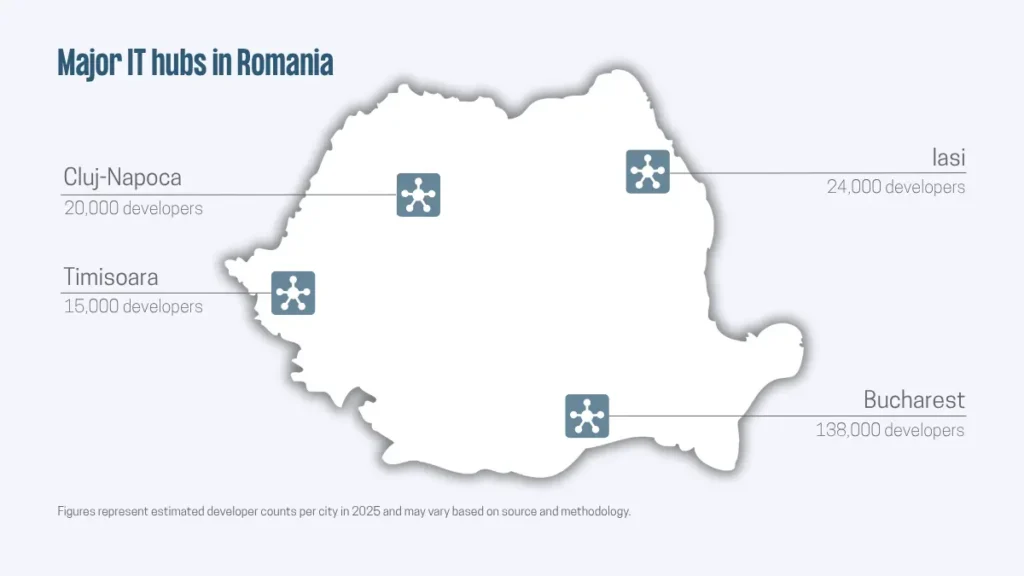
Romania’s strong STEM-focused education system, along with government-supported tech initiatives and foreign investment, continues to fuel this talent pipeline. Whether you’re looking for full product development teams, backend engineers, QA testers, or 24/7 support staff, Romania has the depth and experience to deliver.
ICT specialists per capita
Romania leads Europe – and ranks 6th globally – in the number of certified IT professionals per 1,000 inhabitants – surpassing even the US and Russia. This reflects a deep, skilled tech workforce.
ICT output per employee
According to Outsourcing Today, Romania ranks 2nd in Emerging Europe for „ICT output per employed person” and was 6th in the IT Competitiveness Index 2022, emphasizing both quality and productivity.
Software development market size and growth
In 2023, Romania had approximately 192,000 software developers, with the industry revenue reaching €3.2 billion. The sector is projected to grow at a ~6.9% CAGR through 2025.
Labor productivity gains
Recent Eurostat data indicates Romania experienced a +0.6% increase in real labor productivity per person employed by late 2024.
Employment in tech
As of March 2025, 197,000+ people were employed in the “Information and Communication” sector in Romania.
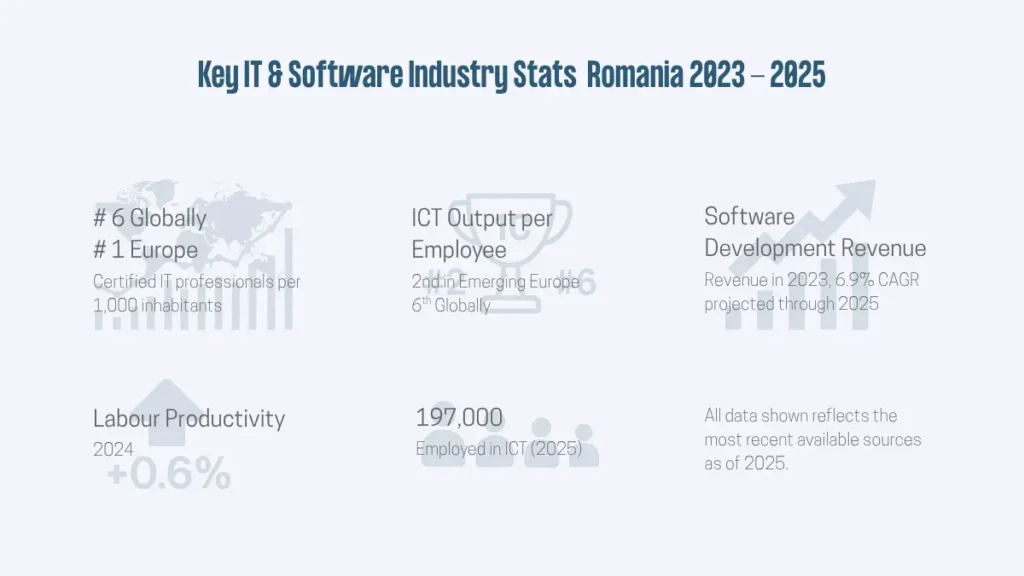
Competitive pricing compared to Western Europe
Another top reason for IT outsourcing in Romania is the clear cost advantage. Compared to the Western countries, Romanian service providers offer better hourly rates.
On average, hourly development rates in Romania range between €25–€50, depending on the complexity of the work and the seniority of the team. Such rates are below those of countries like Germany, Austria, or the Netherlands, where similar software development services can easily exceed €80–€120 per hour.
This cost benefit is particularly worth for startups, and small businesses that need to stretch their budgets while still accessing skilled talent. At the same time, larger companies benefit from reduced operational costs, thus having the opportunity to invest more in innovation and long-term growth.
Anyhow, it’s not just a case of costing less – Romanian software service providers are known for their high level of technical education and problem-solving mindset. So you’re not trading quality for price – you’re just getting better value for money.
As Romania is part of the EU, you don’t need to worry about hidden costs or compliance-related issues, often found in non-EU outsourcing destinations.
Whether you’re looking to build a full development team or outsource a specific IT function, Romania has cost-effective solutions that allow you to scale.
High level of English proficiency
A successful IT outsourcing collaboration depends heavily on communication, and Romania excels at it.
The country ranks among the top non-native English-speaking nations in the world. According to the EF English Proficiency Index 2024, Romania holds the 12th place globally and 10th in Europe. This makes communication with Romanian teams smooth, efficient, and reliable.
But English isn’t the only language where Romania stands out. Thanks to its multicultural heritage and educational focus, many Romanians are multilingual, with strong skills in German, French, Italian, and Spanish. This makes it much easier for companies from German-speaking countries, for example, to work directly with Romanian developers or support teams – often without needing translation layers.
In fact, German is an official language of instruction in several public schools in Romania, taught in 129 kindergartens and 84 schools. In Cluj-Napoca, for example, a major tech hub, the George Coșbuc National College provides German-language instruction at a high academic level. Public schools with German teaching as mother tongue also exist in Timișoara (Nikolaus Lenau High School) and Bucharest (Deutsche Schule Bukarest), thus ensuring a steady flow of young professionals who are fluent in German.
Time zone compatibility with EU countries
Another often underappreciated advantage of IT outsourcing to Romania is the strategic time zone. Having an Eastern European Time (EET) zone (GMT+2), Romania is in a very good position for most of Europe. Moreover, it even offers manageable overlap with North America.
For businesses based in Western and Central Europe like Germany, Denmark, the Netherlands, the time difference to Romania is only one to two hours. This enables teams to collaborate effortlessly during normal business hours. Real-time communication, daily stand-ups, and faster decision-making can be achieved easily. With or without Agile or hybrid project management methods, this time zone allows responsiveness and collaboration.
Even for North American firms, Romania offers partial overlap of work hours. You can delegate work at the end of the working day and have progress made while you sleep – a significant operational advantage.
When compared to outsourcing to countries with a 6–10 hour time difference, Romania’s time zone enables smooth, nearshore collaboration, translating to fewer delays, faster feedback loops, and better project outcomes overall.
EU legislation & data protection compliance
On top of all this, Romania is a member of the European Union, thus the country’s data protection legislation and business practices are inline with those of the European Union.
As a member of the EU since 2007, Romania is subject to all EU directives, including the General Data Protection Regulation (GDPR). This means that Romanian software outsourcing service providers are legally required to follow the same standards of data privacy, security, and transparency as German, French, or any other EU-based firm.
For businesses that deal with confidential customer data or operate in regulated industries like finance, healthcare, or e-commerce, this is reassuring. Working with a Romanian partner safeguards you from the legal and compliance risk typically associated with outsourcing to non-EU countries, where data protection laws might be less strong or inconsistent.
Moreover, Romanian companies are familiar with EU contract norms, intellectual property rights, and procurement practices. This legal compatibility simplifies everything from contract negotiations to dispute resolution, reducing friction and building long-term trust.
Types of Services You Can Outsource to Romania
Romania offers a diverse outsourcing scene that goes far beyond typical programming. Whether you’re a start-up business looking to support software development or a global business in need of multilingual customer service, you’ll find qualified partners in Romania on numerous different services.
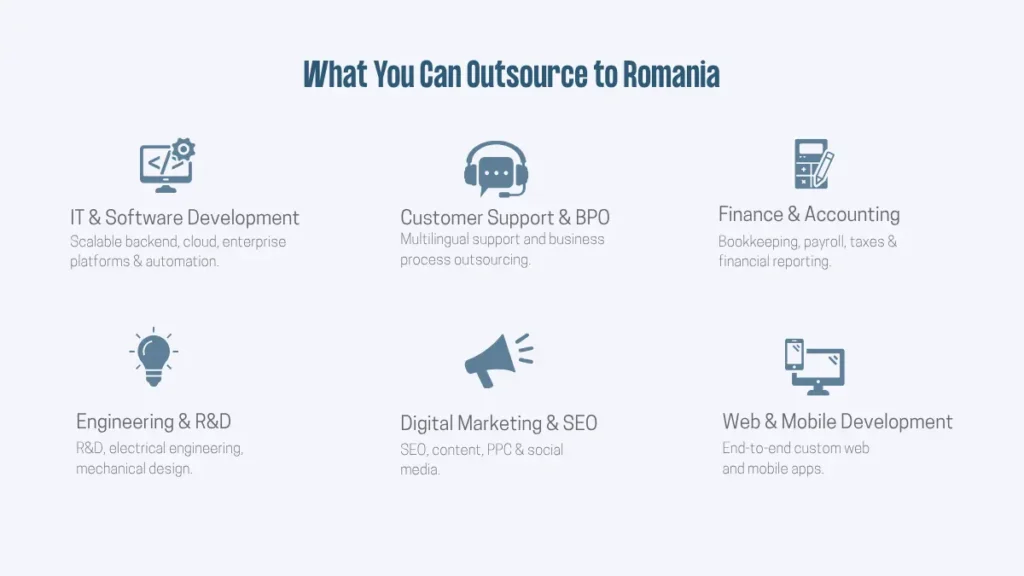
IT & Software Development
This is Romania’s outsourcing center. Whether backend systems and cloud infrastructure or enterprise platforms and automation, Romanian development teams are known for delivering scalable, secure, high-quality software. No surprise that businesses throughout Europe and North America are choosing to outsource software development to Romania as one of their top choices.
Customer Support & BPO
Because of the multilingual talent available in Romania, foreign companies choose to outsource customer support, technical support, and end-to-end business process outsourcing (BPO) to local groups. English, German, French, Italian, and others are typical supported services—ideal for the European markets.
Finance & Accounting
Romania has a growing reputation in the finance and accounting outsourcing sector. You have the option to outsource activities like bookkeeping, payroll, tax filing, and financial analysis to qualified Romanian professionals trained in both local and international standards.
Engineering & R&D
With a strong academic background in STEM fields, Romania is a great place to outsource mechanical design, electrical engineering, and product R&D. Companies benefit from innovation at lower costs, while maintaining EU-level standards and IP protection.
Digital Marketing & SEO
Romanian agencies and freelancers offer expertise in SEO, PPC, content marketing, and social media management. It is particularly useful for companies going international for the first time in European markets.
Web & Mobile App Development
Custom sites, cross-platform mobile applications—whatever the project, Romanian programmers can design, code, and deploy it all, from UX/UI design to full-stack implementation. Their standard is often on par with, even better than, Western European agencies – at a fraction of the cost.
Key Criteria for Choosing the Right Outsourcing Company
Choosing the right outsourcing company in Romania is just about getting the right-priced staff. It’s finding a reliable partner – one that understands your business, with good communication skills, and who delivers reliably. The following are the most important considerations when evaluating potential outsourcing partners.
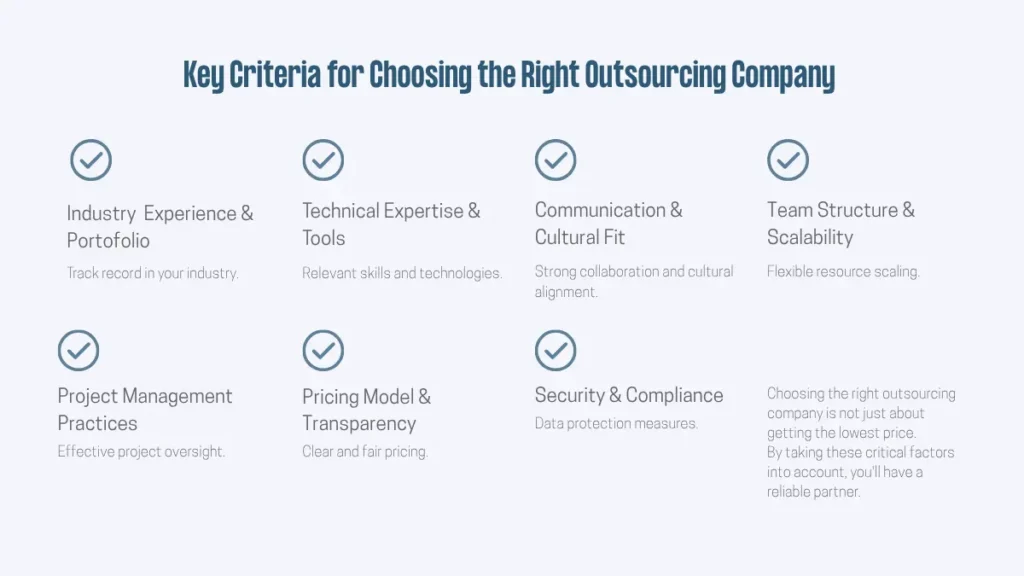
Industry Experience & Portfolio
Start with the history of the company. Do they have experience applicable to your industry? A strong outsourcing partner should be able to offer case studies, testimonials, and a portfolio highlighting projects within similar domains. Domain expertise is important, so you should look for a Romanian outsourcing company that understands the challenges and opportunities in your field.
Technical Expertise & Tools
The right team should have a suitable technical skill set for your project. Ask about their tech stack, development frameworks, and relevant certifications (e.g. ISO, Microsoft Certified Partner, AWS). A good software outsourcing provider will be up to date with new tools and best practices in software development, QA, and DevOps.
Communication & Cultural Fit
Clear communication is vital for remote collaboration. Look for a good English-speaking team and compatible business culture with yours. Romanian programmers are professional, responsible, and familiarized with Western work norms. The second aspect to consider is overlapping time zones—Romania’s proximity to Western Europe allows for easy and comfortable daily collaboration.
Scalability & Team Structure
Your ideal partner should be able to scale resources up or down as per the existing needs. Can they begin with a small team and scale up as your project expands? Do they provide flexibility in terms of team roles, such as developers, testers, or support specialists?
Security & Compliance
Data protection must be a top priority. Make sure the company follows strict GDPR compliance, has secure development processes in place, and uses encrypted communication and infrastructure.
Pricing Model & Transparency
A good outsourcing partner should provide clear pricing and contract. Inquire about the pricing structure: fixed-price models, time & material, or hybrid. Ensure there are no hidden costs.
Project Management Practices
Effective project management is what makes the project advance smoothly. Look for teams using Agile or Scrum methodologies, rolling out updates, and building trackable KPIs. These projects are typically run using tools like Jira, Trello, Slack, or Microsoft Teams.
Choosing the right outsourcing company in Romania is not just about getting the lowest price. By taking these critical factors into account, you’ll have a reliable partner who can help build, grow, and thrive with confidence.
Red Flags to Watch Out For
Not all outsourcing providers are equal. To avoid pitfalls, warning signs should be recognized early on in the evaluation process. Here are some red flags to look out for:
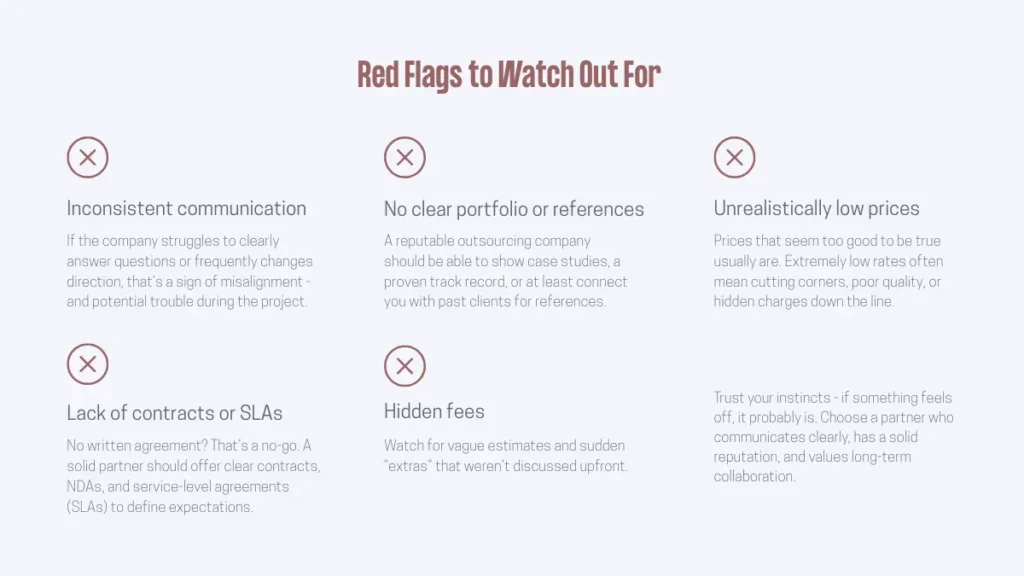
Lack of clear communication
If the company struggles to answer questions clearly, that’s a sign of misalignment and potential trouble further down the road on the project.
No clear portfolio or references
A serious outsourcing partner should be able to present case studies, a proven track record, or refer past clients for references.
Unrealistically low prices
While cost is clearly one of the main benefits of outsourcing, the prices that are too good to be true likely are so. Extremely low prices most definitely equate to cutting corners, poor quality, or additional costs down the road.
No contracts or SLAs
No written agreement? Deal-breaker. A solid partner will offer detailed contracts, NDAs, and service-level agreements (SLAs) to establish expectations and protect your business.
Hidden fees and poor responsiveness
Vague estimates and sudden “extras” that weren’t discussed upfront, and delays in replies can indicate deeper issues in project management or commitment.
How to Evaluate & Compare Outsourcing Proposals
Once you have narrowed down the list of potential partners, it is time to evaluate and compare the proposals.
The Quality & Clarity of Proposals
Serious proposals will include the organization of the team, schedule, deliverables, and a communication methodology. Proposals that are vague or too generic may indicate poor preparedness or demonstrate inexperience.
Video Interviews
The evaluation does not just concern the documents – you also need to meet the team. Video interviews are the most reliable method to demonstrate continuity of purpose and professional practices, as well as illustrating the team’s decision-making process, communication style, and level of English proficiency.
Trial Period
Before signing a long-term agreement, ask for a little pilot or trial run. This offers you a low-risk opportunity to observe how the team works, how they take feedback, and how well they execute.
Team Availability & Scalability
Clarify who will work on your project, their level of experience, and how quickly the team can scale, if needed.
Tools and Collaboration Practices
Ask about what tools they use for project tracking, communication, and code management (i.e., Jira, Trello, Slack, GitHub). Signs of a mature team are Agile methodology, daily stand-ups, and transparent reporting practices.
Legal & Contract Terms
Ensure the proposal includes a set of robust contract terms, IP rights, GDPR compliance, as well as payment terms.
Site Visit (If Necessary)
For larger or extended projects, a site visit can be invaluable. Seeing the team in person – especially if they are located in larger city centers like Cluj-Napoca or Bucharest – is well worth it for getting a closer understanding of their working condition, culture, and facilities.
Take the time to evaluate proposals thoroughly – on paper, on a computer screen, and in person- so that you feel assured about proceeding with the Romanian outsourcing firm that will yield long-term success for your project.
Why Ambo Software Is a Trusted Partner for Outsourcing to Romania
When you are ready to find the most suitable outsourcing company in Romania, Ambo Software will not disappoint you. Based in Cluj-Napoca, one of Romania’s largest tech hubs, Ambo Software has a history since 1999 of offering custom software solutions to help European companies enhance operations and develop new products.
We specialize in custom software development, desktop and web applications, 3D visualization, focusing on complex, high-value technical projects. Our team combines senior-level experience with a collaborative approach that keeps our clients informed at every stage of the process.
Whether your needs are to outsource software development to Romania, or modernize legacy applications, we’ll support you.
Let’s take the next step together! Reach out for a free consultation, or visit our software development offerings in case we can support you.

